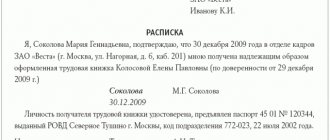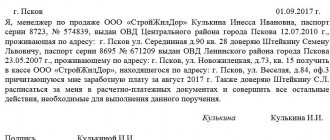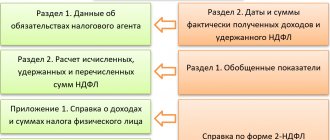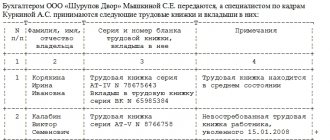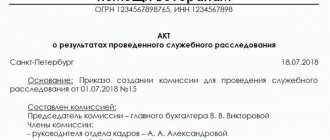Who draws up a document for grandmother or other relatives?
This document is drawn up on behalf of both parents, or on behalf of one of them. Only legal representatives, that is, guardians or parents, can write a power of attorney.
The fact is that without a power of attorney, the child may be provided with services that the parents did not agree to. For example, it often happens that grandmothers are supporters of vaccinations, but parents refuse them. If the representative does not have a power of attorney, and the child receives an unscheduled vaccination, a serious controversial situation may arise. That is why only legal representatives and no one else can draw up a power of attorney.
Can a grandmother pick up a child from kindergarten?
As a rule, this is possible in both municipal and private kindergartens. A standard agreement with a kindergarten usually states that “parents undertake to bring and pick up the child in person.” However, this may be followed by an addition that, in cases where this is not possible, the head and teachers must be notified in advance in writing about the composition of the family and indicate which relatives can pick up the child from the kindergarten. Usually, their passport details are indicated in the annex to the contract and sometimes photographs are attached. In addition, the teacher and/or head may ask parents to bring their grandmother or other relatives to the kindergarten to meet them in person.
What rights are given to an attorney?
The power of attorney may indicate the specific rights of the accompanying person. For example, making decisions about vaccinations, or visiting a pediatrician for advice on treatment. The law does not provide a special form. The power of attorney is drawn up in any form and must contain all the necessary information.
IMPORTANT! such a document implies that the representative has the right to make decisions regarding the provision of medical services, is responsible for these decisions, and provides official information about the child’s medical history (what he is allergic to, what drugs are prohibited, etc.).
He also has the right to sign service agreements and official documents.
Who handles the certification?
You can issue a power of attorney from any notary, and you are also allowed to fill out the form directly in medical institutions. Almost every clinic has its own forms, and certification is carried out by a representative of the administration or any employee of the institution. To do this, the receptionist must check the entered information with the passport data of both the parents and the selected representative.
Information
Not all government agencies can certify a power of attorney form, so they usually require the involvement of a notary.
Options for obtaining a power of attorney to visit a clinic
A power of attorney for the provision of medical services can be issued in written or printed form. There are no clear rules in this regard in the law. You can fill it out on the computer or by hand. It is more convenient for a medical institution if the representative has a printed version of the form. This is because printed text is easier to read.
Poor, illegible handwriting can lead to problems. If the doctor or clinic administrator misunderstands what is written in the power of attorney, services prohibited by the parents may be provided. Therefore, it is better to choose the option typed on a computer.
If the parent’s handwriting is legible and understandable, then filling out “by hand” takes place. This is not prohibited by law.
Design rules
The nuances of document preparation include:
- it can be written by hand or printed on a computer;
- for medical organizations, printed papers are considered the most preferable, since it is easy to read the text;
- if the text is written in illegible handwriting, this may lead to a violation of the rights of mothers and fathers, so the baby will be provided with prohibited services;
- in private organizations there are special forms in which only information about the parents and the chosen guardian is entered;
- It is allowed to use the help of a notary, but he charges a high fee for his services.
Helpful advice
To prevent unpleasant situations, it is recommended that the paper be drawn up by both parents.
Sample
Download
Power of attorney to provide medical services to a child.doc
How to write a permission slip for a child?
In private clinics there is always a form to fill out on the medical institution’s website , which parents can download and fill out. You can also get a similar form from a notary. The law does not prohibit writing a power of attorney in any form. But it must contain mandatory data:
- Information about parents.
- Child details.
- Representative details.
- What rights are being trusted?
- Validity.
- Parent's signature.
- Signature and seal of a notary.
ATTENTION! The header of the power of attorney must indicate the clinic to which the document is provided. If it is written out for provision in any clinic, then the form should be filled out with the word “Power of Attorney”.
Then you need to provide the parent’s details indicating the series and number of the passport, registration and year of birth.
For example: I, Ivanova Marina Aleksandrovna, passport (series and number), issued (date and by whom), date of birth, place of registration. If the document is written on behalf of both parents, then after the data of the first, there should be the data of the second parent.
Then you need to provide the child's details. For example, acting on behalf of your minor child Maxim Petrovich Ivanov, date of birth, birth certificate number (or passport details).
Next there should be a block in which the representative’s data is indicated. For example, I authorize Maria Ivanovna Petrova, passport (series and number), issued (date and by whom), place of registration, date of birth.
Then the powers of the attorney are indicated. They must clearly indicate what rights the representative has. If there are restrictions (for example, he cannot make decisions about vaccinations), then such an indication should be in the power of attorney. A detailed description of powers and responsibilities will help resolve controversial issues.
The last block indicates the validity period of the document, signature and transcript. Must be signed by parents and representative. If the form is certified by a notary. The signature and seal of the notary is affixed. If certified by the administrator, then his signature and the seal of the clinic.
Read more about the procedure for registering a power of attorney for a grandmother for a child in a hospital here, and in this material you will learn how to correctly write a notarized power of attorney for a grandmother for a child.
Power of attorney form
There is no approved form of document for a child. But every family person must know how to write a power of attorney. Depending on the purpose, unofficial forms vary.
- passport details, registration and residence of all participants in the trust deed;
- birth certificate of a minor citizen;
- the purpose of drawing up the document;
- degree of relationship with confirmation
- rights and obligations of a temporary representative;
- information about the notary, his signature and seal, if the form is certified;
- dates of registration and validity of the paper.
There are 3 types of power of attorney:
- one-time – necessary to perform one action;
- special - reusable for solving similar problems within a specified period of time;
- general - opens up a wide range of actions for the owner.
Who can certify?
Parents can draw up such a document at any notary office. Or fill out the form at the clinic. Usually all clinics have the necessary form. Such a document will be certified by the administrator or a registry employee after checking the documents. There is also an option to fill it out and then submit it to a notary or a specific clinic for certification.
Many clinics require official certification from a notary. In some clinics, the administrator can certify the form. To do this, you must provide a completed power of attorney (or write it directly at the clinic) and a copy of the passport of one of the parents to the registry.
The administrator will put the seal of the medical institution and signature. Not all government clinics agree to independently certify the document. Therefore, most often a notarized form is required.
We suggest you familiarize yourself with the materials on whether there is a need for a power of attorney for a child, for example, to travel abroad and how much it costs to register it with a notary. Also read about a power of attorney for a child to travel and about its registration for transportation without parents, including for a grandmother. We also present materials on the father’s consent to the child’s registration with the mother and on the power of attorney for the kindergarten.
Main nuances associated with design
Only parents or guardians (trustees) appointed by the guardianship and trusteeship authorities (CCA) can grant a power of attorney to the grandmother to represent the interests of the child. If the mother or father is no longer alive, the other parent must provide a death certificate.
A child under 14 years of age does not have such a right. From 14 to 18 years of age, a teenager can legally write a power of attorney for a relative, but only with the consent of the mother and father or the person in charge of his guardianship. The exception is when the court emancipates (recognizes as fully capable) a child who has decided to start working early, or a young
a person enters into a marriage relationship. Both situations are permissible from the age of 16.
A power of attorney may also be required for the mother or father if we are talking about protecting the interests of a child from 14 to 18 years of age who has received certain property as an inheritance or gift. In court, the document will confirm the parent’s right to act on behalf of his son or daughter.
A notarized power of attorney from parents to represent the interests of the child is considered the most reliable. If necessary, it can be written directly in the office. A notary actually always has many different forms and templates, based on which it will be easier to draw up a document. The presence of a child is not necessary. The cost of the procedure varies from 100 to 1000 rubles. The document can also be certified in another way.
| Place | Description |
| Job | The manager has the right to certify the power of attorney of his subordinate, who is one of the parents. The legality of the document is confirmed by providing a certificate from the place of work. |
| Place of residence | The document can be confirmed by the HOA (homeowners' association) or the housing cooperative (housing and construction cooperative). |
| Medical institution | A parent who has health problems and is forced to stay in a medical institution for a long time can make a request to the chief physician. He has the right to certify such a power of attorney. |
| Military unit | People serving have the right to contact the commander to certify a document confirming the ability of the grandmother or other relative to represent the interests of the child |
| Place of imprisonment | A parent serving time in prison can have the power of attorney certified by the head of the penitentiary institution. |
Cost and validity period
The cost will depend on the specific notary company. They have the right to set different prices for their services. On average, the cost of such a power of attorney ranges from 500 to 2000 rubles. Certification by the clinic administrator is usually not paid for. The form is certified free of charge.
The validity period is equal to the period specified in the document. If the period is not specified, then the power of attorney is valid for a year. There are no maximum or minimum terms. The parent can set the dates at his own discretion. When the child reaches 15 years of age, if the power of attorney is still valid, it will automatically lose its force. Since the child will begin to represent himself in medical institutions.
Since 2011, according to 323-FZ (“On the basics of health care in the Russian Federation”), when a child visits a medical institution unaccompanied by parents or guardians, the representative must provide a certified power of attorney. Such a document is required in all clinics.
What is meant by the term “general power of attorney”?
There are 3 types of power of attorney:
- One-time – compiled to carry out 1 action.
- Special – required to perform the same type of actions for a specified time.
- General - gives the owner maximum completeness of action.
To take a child out of the Russian Federation, represent his interests and approve emergency hospitalization, parents or authorized persons will need to draw up a general power of attorney. After studying the case materials and confirming the child’s consent, the notary will list the possible consequences. If the parties do not refuse to continue the procedure, the document will be certified.
Expenses
In addition to the documents for writing a power of attorney, you should also take money with you, since notary services are paid. Drawing up the text of the trust form is already included in the service, so it is unlikely that you will be able to save money on this part.
The cost of granting special powers to a grandmother may vary. In state notary offices, such a service will cost between 100 and 500 rubles. If it is necessary to certify the will of two parents at once, the amount can be doubled. Private notaries have higher prices; on average, this service costs from 1000 rubles.
When accompanying a child for treatment, a document can be issued free of charge. The same rule applies in cases where the grandmother transports a minor to his parents, who are in another locality for treatment, study or on a business trip.
Moms, don’t go for a walk in Africa.
Photo from the website villaveo.com
As lawyers explain, consent to accompany a child when he travels abroad also includes accompanying him to a doctor.
If a child leaves, for example, for a camp , then accompanying persons, as well as counselors, must have parents’ telephone numbers for emergency contact. And if they do not work for a long time, then the child will be considered left in danger by the legal representatives.
Another option is to send the necessary papers over the Internet . The N. couple were abroad when the grandparents went on vacation with their son to another country. The child fell ill, the temperature rose above 40 degrees. It was decided to sign all the papers online: the parents gave the hospital administration a copy of the passports and their permission for the grandmother to give consent to all necessary manipulations. Having received an official letter and confirmation from the parents, the doctors began their duties.
If parents are going on a long business trip, it is better to arrange guardianship in advance for those relatives with whom the child currently lives. After all, during the parental absence, it is this person (for example, a grandmother) who is forced to make all decisions regarding the health, life, and education of the child, which means that he needs to be given this right.
In what cases is it required?
A power of attorney to represent the interests of a child as a legal document is issued in extremely rare situations. For example, when traveling abroad with only one of the parents, the other must give written consent to this. When it comes to traveling abroad with your grandmother, you cannot do without a notarized permission. As for movements within the territory of the Russian Federation, the law does not establish the mandatory presence of officially transferred powers. To avoid possible misunderstandings, you can still write permission to move from one or two parents. This measure will be especially valuable when it comes to long distances.
If you do not concern moving, then within the same locality you may need to issue a power of attorney for your grandmother. You cannot do without it in cases where a close relative:
- Regularly takes the child to kindergarten, school or clubs.
- Spends most of the time with the child, and therefore must have permission to make an emergency decision in the event of a visit to the clinic or hospitalization of a minor.
Each situation is unique and one should primarily focus on the requirements of government agencies where the interests of the child are represented.

